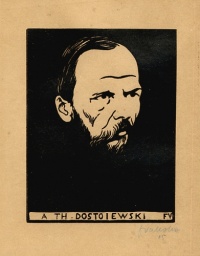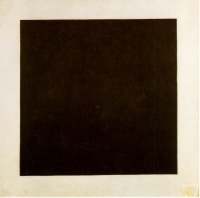Russia
From The Art and Popular Culture Encyclopedia
| Revision as of 11:10, 15 June 2014 Jahsonic (Talk | contribs) ← Previous diff |
Current revision Jahsonic (Talk | contribs) |
||
| Line 1: | Line 1: | ||
| - | [[Image:A Th. Dostoiewski by Vallotton.jpg|thumb|200px|left|[[Fyodor Dostoyevsky]] (1821 – 1881) | + | [[Image:A Th. Dostoiewski by Vallotton.jpg|thumb|200px|left|Fyodor Dostoyevsky (1821 – 1881) |
| - | <br>Illustration: ''[[A Th. Dostoiewski]]'' (1895) by [[Félix Vallotton]]]] | + | <br>Illustration: ''[[A Th. Dostoiewski]]'' (1895) by Félix Vallotton]] |
| + | {| class="toccolours" style="float: left; margin-left: 1em; margin-right: 2em; font-size: 85%; background:#c6dbf7; color:black; width:30em; max-width: 40%;" cellspacing="5" | ||
| + | | style="text-align: left;" | | ||
| + | By medium: [[Russian art]] - [[Russian film]] - [[Russian literature]] - [[Russian music]] | ||
| + | |||
| + | Movements: [[Communism]] - [[Constructivism (art)|constructivism]] - [[Marxism]] | ||
| + | |||
| + | People: [[Mikhail Bakhtin]] - [[Mikhail Bulgakov]] - [[Karl Marx]] - [[Catherine the Great]] - [[Nikolai Gogol]] - [[Fyodor Dostoevsky]] - [[Sergei Eisenstein]] - [[Vladimir Nabokov]] - [[Alexander Pushkin]] - [[Dziga Vertov]] | ||
| + | <hr> | ||
| + | "''[[White Sun of the Desert]]'' (1970 was a very popular [[ostern]] and ''[[Russian Ark]]'' (2002) was the first feature film ever to be shot in a single take."--Sholem Stein | ||
| + | <hr> | ||
| + | "[[The Great Game]] was a political and diplomatic confrontation that existed for most of the [[nineteenth century]] between the [[British Empire]] and the [[Russian Empire]] over [[Afghanistan]] and neighbouring territories in [[Central Asia|Central]] and [[Southern Asia]]."--Sholem Stein | ||
| + | |} | ||
| [[Image:Black Square by Malevich.jpg|thumb|right|200px|''[[Black Square]]'' (1915) by [[Kazimir Malevich]]]] | [[Image:Black Square by Malevich.jpg|thumb|right|200px|''[[Black Square]]'' (1915) by [[Kazimir Malevich]]]] | ||
| [[Image:The red splodge representing the reign of Ivan the Terrible in Gustave Doré's 'The History of Holy Russia'.jpg |thumb|right|200px|[[The red splodge representing the reign of Ivan the Terrible in Gustave Doré's 'The History of Holy Russia']]]] | [[Image:The red splodge representing the reign of Ivan the Terrible in Gustave Doré's 'The History of Holy Russia'.jpg |thumb|right|200px|[[The red splodge representing the reign of Ivan the Terrible in Gustave Doré's 'The History of Holy Russia']]]] | ||
| + | [[Image:Nikolai Yezhov at the shore of the Moskwa-Wolga-Channel.jpg|thumb|right|200px|[[Nikolai Yezhov at the shore of the Moskwa-Wolga-Channel]] [[before and after]]]] | ||
| {{Template}} | {{Template}} | ||
| - | Russia is a country in [[Asia]] and [[Europe]]. | + | Russia is a country in [[Asia]] and [[Europe]]. Population in the [[ex-USSR]] and [[Eastern Europe]] is rapidly shrinking due to low birth rates, very high death rates (linked to [[alcoholism]] and high rates of infectious diseases such as [[AIDS]] and [[Tuberculosis|TB]]), as well as high emigration rates. In Russia and the former communist bloc, [[Russian Cross|birth rates fell abruptly]] after [[History of Russia (1991–present)|the fall of the Soviet Union]], and death rates generally rose sharply. In addition, in the 25 years after 1989, some 20 million people from Eastern Europe are estimated to have migrated to Western Europe or the United States. |
| - | + | ||
| == Russian culture == | == Russian culture == | ||
| Line 14: | Line 26: | ||
| Russia has a revered and recognised tradition of [[ballet]]. Russian composer [[Pyotr Ilyich Tchaikovsky]] composed the most famous works of ballet - [[Swan Lake]], [[The Nutcracker]], and [[Sleeping Beauty]]. During the early 20th century, Russian dancers [[Anna Pavlova]] and [[Vaslav Nijinsky]] rose to fame, and [[Ballets Russes]]' travels abroad profoundly influenced the development of dance worldwide for decades to come. | Russia has a revered and recognised tradition of [[ballet]]. Russian composer [[Pyotr Ilyich Tchaikovsky]] composed the most famous works of ballet - [[Swan Lake]], [[The Nutcracker]], and [[Sleeping Beauty]]. During the early 20th century, Russian dancers [[Anna Pavlova]] and [[Vaslav Nijinsky]] rose to fame, and [[Ballets Russes]]' travels abroad profoundly influenced the development of dance worldwide for decades to come. | ||
| - | [[Russian film]]making came to prominence during the [[1920s]] when it explored editing as the primary mode of cinematic expression, resulted in world-renowned films such as ''[[The Battleship Potemkin|Battleship Potemkin]]''. This outburst of creativity and innovation was short-lived, however. In the 1930s, [[Soviet censorship]] stifled creativity. Later Soviet-era filmmakers, most notably [[Sergei Eisenstein]] and [[Andrei Tarkovsky]], would become some of the world's most innovative and influential directors. Russian cinema has been transformed since the dissolution of the Soviet Union. During the 1990s, Russian filmmaking decreased sharply, but recent years have brought increased viewership and subsequent prosperity to the industry through exploration of contemporary subjects. | + | [[Russian film]]making came to prominence during the [[1920s]] when it explored editing as the primary mode of cinematic expression, resulted in world-renowned films such as ''[[The Battleship Potemkin|Battleship Potemkin]]''. This outburst of creativity and innovation was short-lived, however. In the 1930s, [[Soviet censorship]] stifled creativity. Later Soviet-era filmmakers, most notably [[Sergei Eisenstein]] and [[Andrei Tarkovsky]], would become some of the world's most innovative and influential directors. Russian cinema has been transformed since the [[dissolution of the Soviet Union]]. During the 1990s, Russian filmmaking decreased sharply, but recent years have brought increased viewership and subsequent prosperity to the industry through exploration of contemporary subjects. |
| - | == See also == | + | ==See also== |
| - | + | *[[LGBT rights in Russia ]] | |
| - | *''[[Rabelais and His World]]'' by Russian scholar Mikhail Bakhtin | + | * ''[[Russian Ark]]'' (2002) by Alexander Sokurov |
| + | *''[[Rabelais and His World]]'' (1965) by Mikhail Bakhtin | ||
| + | *''[[The Master and Margarita]]'' (1967) by Mikhail Bulgakov | ||
| *[[Cinema of the Soviet Union]] | *[[Cinema of the Soviet Union]] | ||
| *[[Russian avant-garde]] | *[[Russian avant-garde]] | ||
| + | *[[Red Scare]] | ||
| + | *[[Russian Revolution]] | ||
| + | *[[Russian folklore]] | ||
| + | *[[Culture of the Soviet Union]] | ||
| + | *[[Music of Russia|Russian music]] | ||
| + | *[[Russian art]] | ||
| + | *[[Russian jokes]] | ||
| + | *[[Russian religion]] | ||
| + | *[[Russian literature]] | ||
| + | *[[Cinema of Russia and Soviet Union]] | ||
| + | *[[Ballets Russes]] | ||
| + | *''[[What Every Russian Knows (and You Don't)]]'' | ||
| + | *[[2022 Russian invasion of Ukraine]] | ||
| + | *''[[Nothing Is True and Everything Is Possible]]'' | ||
| + | *[[Dissolution of the Soviet Union]] | ||
| + | *[[Russian Empire]] | ||
| {{GFDL}} | {{GFDL}} | ||
Current revision
|
By medium: Russian art - Russian film - Russian literature - Russian music Movements: Communism - constructivism - Marxism People: Mikhail Bakhtin - Mikhail Bulgakov - Karl Marx - Catherine the Great - Nikolai Gogol - Fyodor Dostoevsky - Sergei Eisenstein - Vladimir Nabokov - Alexander Pushkin - Dziga Vertov "White Sun of the Desert (1970 was a very popular ostern and Russian Ark (2002) was the first feature film ever to be shot in a single take."--Sholem Stein "The Great Game was a political and diplomatic confrontation that existed for most of the nineteenth century between the British Empire and the Russian Empire over Afghanistan and neighbouring territories in Central and Southern Asia."--Sholem Stein |
|
Related e |
|
Featured: |
Russia is a country in Asia and Europe. Population in the ex-USSR and Eastern Europe is rapidly shrinking due to low birth rates, very high death rates (linked to alcoholism and high rates of infectious diseases such as AIDS and TB), as well as high emigration rates. In Russia and the former communist bloc, birth rates fell abruptly after the fall of the Soviet Union, and death rates generally rose sharply. In addition, in the 25 years after 1989, some 20 million people from Eastern Europe are estimated to have migrated to Western Europe or the United States.
Russian culture
Russian literature is considered to be among the most influential literature in the world. Russia has a rich literary history, beginning with the poet Alexander Pushkin, considered the greatest Russian poet and often described as the "Russian Shakespeare". In the nineteenth century Russian literature underwent an astounding golden age, beginning with the poet Pushkin and culminating in two of the greatest novelists in world literature, Leo Tolstoy and Fyodor Dostoevsky. Russia has remained a leading nation in literature since that time. Significant Russian writers of the Soviet period were Boris Pasternak. In the field of the novel, Tolstoy and Dostoevsky in particular were titanic figures, and have remained internationally renowned, to the point that many scholars have described one or the other as the greatest novelist ever.
In music, the Romantic tradition of Tchaikovsky was brought into the 20th century by Sergei Rachmaninoff. During the Soviet Era, music was highly scrutinized and kept within certain boundaries of content and innovation; notable composers included Stravinsky, Prokofiev, and Shostakovich.
Russia has a revered and recognised tradition of ballet. Russian composer Pyotr Ilyich Tchaikovsky composed the most famous works of ballet - Swan Lake, The Nutcracker, and Sleeping Beauty. During the early 20th century, Russian dancers Anna Pavlova and Vaslav Nijinsky rose to fame, and Ballets Russes' travels abroad profoundly influenced the development of dance worldwide for decades to come.
Russian filmmaking came to prominence during the 1920s when it explored editing as the primary mode of cinematic expression, resulted in world-renowned films such as Battleship Potemkin. This outburst of creativity and innovation was short-lived, however. In the 1930s, Soviet censorship stifled creativity. Later Soviet-era filmmakers, most notably Sergei Eisenstein and Andrei Tarkovsky, would become some of the world's most innovative and influential directors. Russian cinema has been transformed since the dissolution of the Soviet Union. During the 1990s, Russian filmmaking decreased sharply, but recent years have brought increased viewership and subsequent prosperity to the industry through exploration of contemporary subjects.
See also
- LGBT rights in Russia
- Russian Ark (2002) by Alexander Sokurov
- Rabelais and His World (1965) by Mikhail Bakhtin
- The Master and Margarita (1967) by Mikhail Bulgakov
- Cinema of the Soviet Union
- Russian avant-garde
- Red Scare
- Russian Revolution
- Russian folklore
- Culture of the Soviet Union
- Russian music
- Russian art
- Russian jokes
- Russian religion
- Russian literature
- Cinema of Russia and Soviet Union
- Ballets Russes
- What Every Russian Knows (and You Don't)
- 2022 Russian invasion of Ukraine
- Nothing Is True and Everything Is Possible
- Dissolution of the Soviet Union
- Russian Empire





